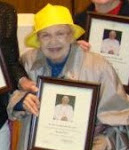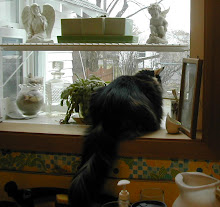Startled, I heard Mom’s notebook hit the floor and turned to make sure she wasn’t following its path. She had parked her walker and, using the handle bolted into the door frame, had turned to face the three steps, which Don has made into four half-steps, leading down into the attached apartment. Recognizing that the notebook hadn’t fallen, but was carefully tossed to the bottom of the stairs, I realized what she was doing and resisted the overwhelming urge to go and help her. Rooted to my spot, I watched as she transferred her cane and then her grip to the set of parallel handrails and carefully eased her way down the steps. Once both feet were safely on terra firma, she retrieved her cane, worked her way over to her notebook, and then slowly bent over and picked it up with her free hand before taking it to her desk.
This arduous process is typical for Mom these days. At 96, everything is an effort. Her arthritic knees crunch and hurt when she moves, her balance is terribly unsteady, and her bent fingers and diminished muscle tone make it difficult for her to lift or grasp things. Rushing to her aid is a natural impulse for all of us, but I have found that it is better for her in the long run if I balance it with watchful patience; a quality with which I struggle.
Since I can take those little stairs in one or two strides, it is much easier and quicker for me to transfer items to and from her rooms. When she is sitting comfortably in her chair in the living room, where everything she needs is right around her, I can fix her lunch and bring it to her little table before she can even rise to her feet. Similarly, I can unload the dishwasher and put everything away before she even makes it to the kitchen. When Ellie rings the bells to go outside, Don and I jump up or stroll in from another room to meet her demands with much less effort than it takes Mom. Not only is it faster for us, but we feel like we are helping her in a small way after all the years she helped us and our kids. However, as with everything, there is a gray area.
Too much of this help can have a negative effect; can become almost enabling to the effects of age. I have learned the hard way that when Mom is not allowed to do enough for herself, she not only loses strength and stamina, but also becomes depressed that she isn’t contributing. She feels that she is causing us too much trouble and that we would be freer to do things if she wasn’t around. We have managed to convince her otherwise, but it made us take on a new perspective ourselves.
We still do things for Mom, but we are careful to make sure we don’t rob her of every reason to get up and move around. I may still let Ellie in and out twenty times a day, but I don’t jump up to do it if I see Mom getting to her feet. We clean up the dirty pots and pans, but leave a few glasses on the counter for Mom to put in the dishwasher if she decides to putter in the kitchen after dinner. Although I carry bulky things up and down the stairs for her, I don’t always rush to her rescue over little things now that I know she feels a certain amount of pride in her successful struggles. “I did it!” she proclaims as she straightens up with the notebook in her hand. Once again, she has not let the nineties defeat her.
Wednesday, January 20, 2010
Subscribe to:
Post Comments (Atom)

























No comments:
Post a Comment